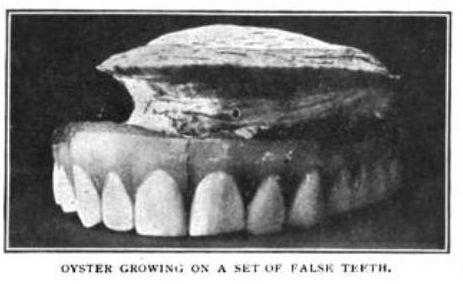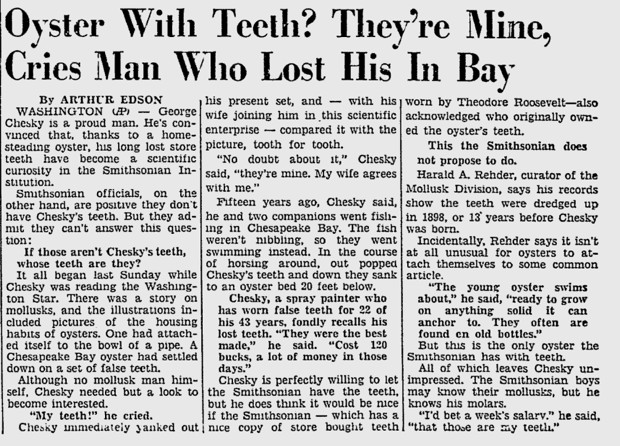Oyster Growing on a Set of False Teeth

image source: The Strand magazine - 1903
Oysters will grow on almost any surface, including false teeth, if that's what happens to be available. The tooth-growing oyster shown above was found in the Chesapeake Bay in 1898, and sent to the Smithsonian where they were put on display and became quite a popular attraction. But soon a paternity battle erupted around them. The story was told in the Saint Paul Globe (Nov 30, 1902):
Experts of the United States fish commission have made a special study of the conditions under which oysters grow, and, to illustrate the adaptability of the mollusks, they have got together a very curious collection of objects. It comprises oysters growing upon a great variety of things, such as old boots, rubber shoes, beer glasses, and even a lantern. There is a broken bottle inside of which, as well as on the outside, oysters have found a home.
And, oddest of all, there is an upper set of false teeth to which an enterprising oyster is firmly attached.
The history of this last oyster is decidedly interesting. About four years ago it was raked out of the waters of Chesapeake bay by a dredging boat, together with the false teeth to which it was firmly fixed, and teeth and oyster were acquired by a hotel keeper at Cowart, Va., whose wife forwarded them to the Smithsonian Institution at Washington. The matter obtaining some advertisement, a man named Webster, residing in Bedford, Iowa, claimed the teeth, saying that he had lost them from a steamer bound for Norfolk.
The Smithsonian officials were undecided at first as to whether they should surrender the teeth or not, the object being so great a curiosity that they were anxious to hold on to it. But not many days later a Philadelphia woman claimed them, asserting that they were hers, and actually a third party, visiting the institution, demanded them, declaring that he recognized them as having been lost by himself.
Probably, from first to last, a good many persons have lost their false teeth overboard in the Chesapeake, the waters of which are liable to be pretty rough at times. Any way, the government scientists did not care to decide the dispute, and concluded to retain the specimen.
And, oddest of all, there is an upper set of false teeth to which an enterprising oyster is firmly attached.
The history of this last oyster is decidedly interesting. About four years ago it was raked out of the waters of Chesapeake bay by a dredging boat, together with the false teeth to which it was firmly fixed, and teeth and oyster were acquired by a hotel keeper at Cowart, Va., whose wife forwarded them to the Smithsonian Institution at Washington. The matter obtaining some advertisement, a man named Webster, residing in Bedford, Iowa, claimed the teeth, saying that he had lost them from a steamer bound for Norfolk.
The Smithsonian officials were undecided at first as to whether they should surrender the teeth or not, the object being so great a curiosity that they were anxious to hold on to it. But not many days later a Philadelphia woman claimed them, asserting that they were hers, and actually a third party, visiting the institution, demanded them, declaring that he recognized them as having been lost by himself.
Probably, from first to last, a good many persons have lost their false teeth overboard in the Chesapeake, the waters of which are liable to be pretty rough at times. Any way, the government scientists did not care to decide the dispute, and concluded to retain the specimen.
Half a century later, in 1954, yet another guy insisted the teeth were his, but in this case the Smithsonian was able to definitively rule out his claim, pointing out that the guy hadn't even been born yet when the teeth were found.
I'm guessing the Smithsonian probably still has this tooth-growing oyster hidden away somewhere in its archives.

Daytona Beach Morning Journal - Jan 28, 1954
Comments
Some folks will go to any lengths for a free meal!
Posted by Expat47 in Athens, Greece on 11/26/12 at 10:01 AM
The beauty of a set of false teeth is that you never need to go to a dentist to have them worked on - you just mail them in.
Posted by KDP on 11/26/12 at 10:32 AM
Nowadays if someone claimed something like that they would be threatened with a fine for littering the bay. No more claim then.
Posted by Patty in Ohio, USA on 11/26/12 at 09:12 PM
Commenting is not available in this channel entry.

Category: Freaks, Oddities, Quirks of Nature | Museums | Oceans and Maritime Pursuits | Natural Wonders